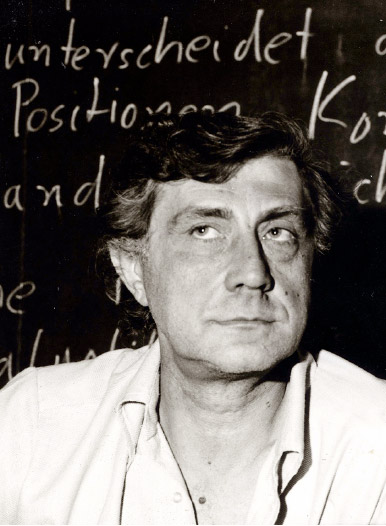(Venice, 1924 –1980)
There are moments, in the history of humankind, in which the entire society is involved in the perpetration of violence and injustice. In these situations most of the men, despite their education and intelligence, are not able to see the crimes of which they are guilty. Everyone tries to justify the horrors he sees (or deliberately does not see), saying that there is no alternative, convincing himself that despite the violence it is the “best solution”. It happened at the time of slavery. It happened when Germany decided to ostracize and then to exterminate whole categories of people for their different racial origins and religious beliefs. It still happens now, in industrial butcheries, in slavery-like industries, in inhumane prisons. In all these situations few men and women understood that all the reasons provided by society were excuses and listening their hearts stood against the injustice and tried to change the world. Franco Basaglia, Italian psychiatrist, belongs to this category of heroes.
“Tomorrow morning, at visiting time, when without any lexicon you try to communicate with these men, you will be able to remember and recognise that, in comparison with them, you are superior in only one way: force.”
During the 1960s, in Italy as well as in the rest of the world, people who were diagnosed with psychiatric illness were segregated in asylums. Mentally weak people, men and women with genetic disorders like Down syndrome, gays, lesbians and transvestites, women who refused the role of daughters and mothers that the rigid patriarchal moral customs imposed on them, could all receive a psychiatric diagnosis and be institutionalized. Officially the function of asylums was to take care of and heal the people that were recovered. However, in reality it was a rarity, an exception for someone to leave the asylum once he entered. People could not hope to get better inside the psychiatric hospitals, they were only taken away from society, hidden from the “normal people”; eliminated as a problem. The administration of the “alienated” followed these principles. Patients had to follow the strict rules imposed by the structure. Every act of insubordination from a sad and routine reality made up of bad food and prison-like environments was punished with water jets, straight-jackets and electro-shocks. The most rebellious patients, those who could not accept this reality and reacted with violence, were chained or tied to their beds, for weeks, months, years, sometimes for their entire lives.
“If mental illness is a loss of individuality and liberty, in the “loonybin” the mental patient can find nothing more than a place where he will be definitely lost, where he will be made the object of by his illness and by those who treat him.”
This was the situation found by Franco Basaglia when in 1961 he became director of the psychiatric hospital of Gorizia. He came from university where he had taught Psychiatry for three years, psychiatry diffusing the ideas of Jaspers, Minkowsky, Binswanger, a group of philosophers and psychiatrists who thought that a positivist approach was not enough to treat the mentally illness as it was necessary to consider the person in his unicity, in his needs, in his phenomenology. When he saw what happened in the asylum, he was shocked. He decided to change it. In three years, fighting the prejudices of doctors and nurses, he eliminated every type of coercive methodfrom the hospital. He recognized the need of mental patients tobuild a life and he introduced art classes and the possibility to have a salaried jobin the hospital. His next step was to open the doors of the institution allowing patients to get in and out from the hospital during the day. The number of escapes, instead of increasing, dramatically decreased.
“The object of psychiatry is not anymore the patient who frightens others, but the sick man who is afraid.”
After demonstrating that mental institutions were not effective in their roleof healing and that another form of psychiatry was possible, Basaglia started his hardest and most important fight: to close every asylum in Italy and consequentially free mental patients from the paternalist and oppressive grip of the institutionalization. Indeed, even with improved psychiatric hospitals, people could have never experienced the freedom necessary for living a healthy and generative life. To pursue thegoal of liberating all mental patients from their fate, in 1973 he founded a civic and political movement called Psichiatria Democratica, whose main purpose is the closure of asylums all over the world. In 1978 the movement obtained the approbation of Legge 180, the first law in the world to establish the end of psychiatric hospitals. The law considered a wide number of alternative solutions like occupational therapy, mental patients communities and part-time hospitals, but they are still not consistently implemented in all the regions of Italy, where the problem of providing adequate mental health care is far from being solved. Basaglia died from brain cancer in 1980, two years after the approbation of the law and hence too early to contribute to the actual change in the administration of psychiatric patients.
“Will be able the principle of freedom to win against the principle of authority?”
As it was said, the Legge 180 was the first of its kind in the world. After that, many other European nations started reforming their mental care systems, even if no intervention was as revolutionary as the one sought by Basaglia. His academic, political, and especially his medical work are still an inspiration for psychiatrists and politics all over our continent and beyond. Few topics are as complex as the care of mentally ill people, but Franco Basaglia’s work should always remind everyone that it is the task of doctors and institutions to make people, also ill, weird, lunatic people, live better lives. The situation of the mentally ill still waries across Europe. “Psichiatria Democratica” is still fighting to protect human rights and close asylums where they still exists, including a number of EU countries.
The Europe that I dream of should guarantee efficient and modern healthcare for all its citizens, including those who suffer from mental illnesses. The Europe that I dream of should never forget the fights of Franco Basaglia.
All the quotes come from: “La distruzione dell’ospedale psichiatrico come luogo di istuzionalizzazione”, Franco Basaglia, 1964. Retrived from http://www.triestesalutementale.it/letteratura/testi/35distr.htm 20/8/2014.

(Franco Basaglia (1979) / Foto: Harald Bischoff / Quelle: Wikimedia /
